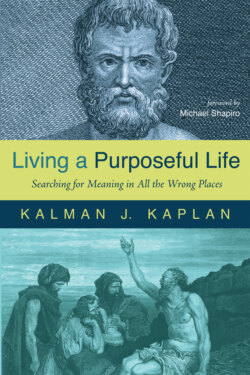Читать книгу Living a Purposeful Life - Kalman J. Kaplan - Страница 7
На сайте Литреса книга снята с продажи.
Foreword
ОглавлениеKalman Kaplan’s distinction between Meaning and Purpose reminds me of an encounter I once had with a Hasidic rabbi on Devon Avenue in Chicago. He had agreed to meet with Confirmation students from my Reform synagogue in Champaign, whom I had brought to Chicago for the weekend to enrich their experience of Jewish life. The rebbe was a young man, but to my students his demeanor, sidelocks, and fringes made him seem to them like an ancient sage from remote antiquity. To break the ice, he went around the table asking them, girls included, what they hoped to do in their adult lives. Most of them answered in terms of vocational plans, plans they explained would bring them happiness. He wished them well in fulfilling their aspirations, many of which he deemed quite worthy, but he also issued a caveat about happiness. Happiness, he warned, is not gained by seeking it, but it rather comes unsought when one is fulfilling his or her responsibilities. He did not define these responsibilities, but I understood him to mean, or to include, what Kaplan describes as purposeful or purposive behavior inherent or intrinsic in human existence, that is to say, responsibilities to family and community based on obligations of love and loyalty. For me, Kaplan’s understanding of the meaning of life resonated with the rabbi’s comment on happiness: both meaning and happiness are byproducts of a life well lived, a life of fulfilled responsibilities. As Kaplan puts it in his final sentence, “Meaning cannot be found directly but only as a consequence of living with purpose.”
Like other scholars critical of Ancient Greece, Kaplan sees the twin poles of glory and shame in Athenian culture as encouraging individuals to actively seek meaning in their lives rather than allow it to emerge from sustained purposeful commitment and conduct. This hunt for significance, he argues, can be dangerous. It can lead one to undertake risky choices in pursuit of honor or public acclaim, and it can lead to the neglect or disparagement of unglamorous domestic and familial commitments, which the poet Linda Pastan in “Who Is It Accuses Us?” calls the truly “dangerous lives.” In Kaplan’s view, the purposefulness affirmed in the Hebrew Bible is far superior to the search for meaning encouraged in and by ancient Greek culture, a contrast he observes incisively across many areas of life. But Kaplan sees this contrast between the Hellenic and the Hebraic not only as a collision between two ancient civilizations, but as opposing tendencies within our own civilization as well.
Michael Shapiro
